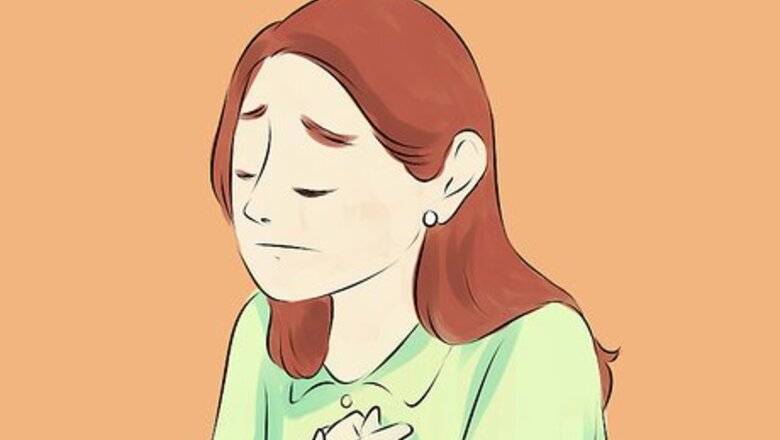
views
Getting Over the Past

Grieve for a while. You need to be “available” to find true love. The first thing is to get over heartache or past love, accept the loss, and start to come to terms with it. This takes time. It’s also hard. But, you’ll never be able to move on if you don’t stop to grieve. Make the choice to let go. Say to yourself, “It’s over and I need to move on.” Otherwise, you may end up sabotaging your future efforts. Express your pain. Part of grieving is emotion! Let it out directly, vent to a friend, or write it out in a letter that you’ll never send to your ex. Forgive. This is a key part of moving on. It doesn’t mean forgetting what happened, but choosing to release your hurt and anger and move forward.

Don’t give in to self-pity. Grieving is totally natural, but try not to get carried away. Take ownership for the past and don’t cast yourself as a victim in love. After all, you played a part in your relationships. While grieving, acknowledge your role in the heartbreak. Ask yourself, “Did I go wrong? How? What could I have done differently?” Self-pity is easy and feels good. Resist it. Say, “I’m not going to keep feeling bad about someone else and what they did; I’m going to start to feel good.”

Do some self-examination. As said, coming to terms with the past isn’t easy. But you need to be honest and confront it head-on, rather than letting things fester. Do some serious self-examination. Look at your personal qualities with an eye to self-improvement. List your strengths and weaknesses. Write down things – qualities, talents, habits, ticks – that you consider to be strengths, like generosity or emotional openness. Then, list weaknesses. Are you a natural pessimist, for example? Maybe you are stingy with money? Note common elements. Do you always tend to love the same type of people? Are there mistakes, patterns, or repeated dynamics in your past relationships? Try to find and identify what they are.

See the past as a lesson rather than a failure. You may be hurting, but try to see it as an opportunity to learn about yourself and what can and will make you happy in the future. Finding true love is hard, to be sure, and not guaranteed. But you’ll have a better shot with better self-understanding. Remember things as they were. Don’t idealize your past loves, but distinguish what made the relationship exciting and memorable from what caused it to fail. Be hopeful and open to love. One heartbreak doesn’t mean that you won’t ever love again, but you have to let it happen.
Bettering Yourself

Value your independence. Whether you are long single or getting over heart-break, try to value your independence. Remember that you don’t need true love to make you happy, because happiness comes from inside. It’s OK (and healthy) to focus on yourself sometimes. Being single comes with freedom: you can do the things you enjoy, when you want to. Do you want to go for a swim at 6:00 every morning? Sure thing. Do you like to sit around and watch TV in sweatpants after work? Go right ahead! Being independent gives you the chance to be selfish, too. Focus on your career and work long hours, if you’re ambitious. Or, spend more time on your hobbies and friends. Use the time for self-exploration, too. Being single, you can spend energy figuring out your needs rather than on those of a partner.

Articulate what you want in love. Some of us already have a clear vision of true love, while others need some time to figure it out. You may have a sense of what you’re looking for, but need time to articulate your ideal partner. Start with your core needs. What things are “must haves”? Do you need a partner who shares your social or religious values? Who wants a family? Who understands and validates your career? Learn to understand your own emotional needs. Think of earlier relationships and what made you feel fulfilled and what didn’t. You might need good chemistry, for example, but you also might need loyalty or a strong intellectual connection. Be aware that true love isn’t a magic potion. It can’t make you feel worthwhile, happy, or whole in life, at least not by itself. These things ultimately have to come from inside of you.

Make a list of personal goals. Remember that self-examination? Start to act on it. Figure out what positive qualities you’ve got going, but also those you need to work on. Set up clear goals to aspire and work toward. Write your goals down. What do you want to be better at? Do you need to be a better listener? To show more empathy? Or perhaps to be more generous with your time? Ask yourself whether each goal is realistic, achievable, and about you as a person. Make sure that the goals are also worded positively. That is, they should be about getting better and not at removing something from your life. Write that you want to get better at expressing emotion, and not that you want to be less cold to others. Set a time-frame and list specific things that you are doing or will do to address each goal. To be more generous with your time, for instance, you might say that you will volunteer at a soup kitchen once a month for the next three months. Set your list in a visible place. Put it on your mirror, your fridge door, or in your office to see. Keep it close so you can see it every day.

Be as healthy as you can. Try to be the best person you can, in mind, spirit, and body. That said, pay attention to your health as you better yourself. Eat good food, sleep well, rest, and reduce stress. Your health is important in preparing yourself for true love. Make it a priority. Exercise, a good diet, and rest will give you more energy and vim and put you in a positive frame of mind. Aim for a diet rich in vegetables, fruit, whole grains, and lean meats, for example. Take up an exercise routine. Doctors recommend at least 130 minutes of moderate activity per week for optimal health. This will help if you’re still healing from heartache, releasing feel-good, depression-beating endorphins. Exercise will not only make you healthy and happier, but it can also help you manage stress and boost your self-confidence around other people – all important in finding a partner.
Meeting New People

Take the first step. Finding someone special – maybe even a true love – takes a resolution on your part. You have to put yourself on the line, to get out there and meet people. But are you ready? Take some time to self-assess before making the plunge. Have you properly grieved? Did you take the time to come to terms with your earlier losses in love? If not, you might be acting for the wrong reasons. Are you happy on your own? Looking for someone to “make you happy” or fill a void in your life is usually a bad idea. Have you let go of any lingering anger? Are you emotionally open to a relationship? If you’ve said yes to these questions, there’s a good chance that you are really ready to start meeting new people.

Join clubs or group activities. There are tons of ways to meet people and connect. Start with places where you’re more likely to find others with shared interests or views. Clubs and group activities are great for this reason. The common ground will also mean you don’t have to worry as much about breaking the ice. Sign up for ballroom dance lessons, for example. You’ll learn great moves and get to boogie with many different partners. Try a book club at your local library, alternatively. Read and discuss interesting novels at monthly or weekly meetings. Are you artistic? Sign up for painting or sculpting at a local college, or an art appreciation course at your nearest art museum. Take a language course. Have you always wanted to learn Italian? Sign up for lessons – you’ll meet new and very interesting people.

Play the internet dating scene. Nowadays online dating has gone mainstream. In fact, nearly half of Americans know someone who is using an online dating service or who met a partner online. It’s becoming common for most age groups, even people in their 40s, 50s, and up. Sign up for a service like Match.com or OKCupid. Most use metrics to try to match you with people who share not just interests but also values and outlook. One of the big pros of online dating is that you can, potentially, meet a lot of new people. You can also filter them out. On the other hand, the choice might be a bit overwhelming. Plus, your potential dates are not always accurate in their personal descriptions.

Try traditional dating. While the rise of internet dating has cut into tradition venues like bars and clubs, people do still meet each other face-to-face. There are plenty of other places and ways to make new friends and meet new people, without a computer screen standing between you. Blind dates can be spotty, but they sometimes work out. Ask a friend to set you up or, if you need more assurance, try a professional dating agency. You might also consider signing up for a singles holiday. There are plenty of companies that offer getaways aimed at singles and encouraging romance. Are you a romantic at heart? Why not place a classified ad? “SM seeks SF with a good sense of humor for romantic walks on the beach and fireside chats.”

Take it slow. Love builds from friendship in most cases. Most everyone wants to be friends with the person they date. If you're looking for true love, start out by building a genuine friendship and a relationship based on affection, shared values, and mutual respect. Let intimacy grow naturally. You might feel ready for it right away or it might take a while. The important thing is not to rush it. Don’t be afraid to fall in love. If a person makes you feel fulfilled and happy, they may be the right material.



















Comments
0 comment